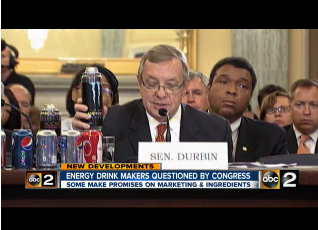 ess is considering tighter regulations on the energy drink industry -- after reports of deaths related to those beverages.
ess is considering tighter regulations on the energy drink industry -- after reports of deaths related to those beverages.One of them was 14-year-old Anais Fournier of Hagerstown, who died in December of 2011 after drinking two 24-ounce Monster Energy drinks.
Her family is suing that company.
Fournier had a heart condition -- her family's attorney, Kevin Goldberg, tells ABC-2 News one problem is that many children are too young to have ever gotten that diagnosis. And consuming highly-caffeinated beverages is like pouring gasoline on a fire they don't even know is there.
The US Department of Health and Human Services found that in 2007, there were about 10,000 emergency room visits related to energy drinks. By 2010 that number doubled to 20,000.
And on Wednesday senior executives from Monster Beverage, Red Bull and Rockstar appeared before the U.S. Senate's Commerce Committee.
“These cans are sold in convenience stores right next to the Gatorade and soft drinks. But just one of these cans contains the same amount of caffeine as almost seven cans of soda,” said Sen. Dick Durbin (D-Illinois).
The companies responded that their ads are not targeted to children. But, they do sponsor extreme sports competitions, and they are active on social media.
An executive from Red Bull promised changes. “Red Bull will not encourage or condone the excessive or rapid consumption of its energy drinks. Our marketing will not say that more caffeine or larger sizes or higher concentrations of caffeine have a better or stronger effect,” said Amy Taylor, vice president of Red Bull North America.
Rodney Sacks, the chief executive of Monster, came with a different strategy.
“The level of caffeine in monster energy drinks is about half the caffeine per ounce of coffee-house brewed coffee,” he told the committee.
The attorney for Anais Fornier’s family, Kevin Goldberg, is also representing another family in a case where a loved one died after consuming energy drinks.
No trial dates have been set -- but he also said he has more potential clients who are planning to file lawsuits as well.
He says he's hoping for a nationwide ban on the sales of those types of drinks to teens 16 and younger -- or at least a ban on marketing to those teens if the beverage companies aren't willing to do it voluntarily.
Last year companies sold more than $12-billion worth of energy drinks United States. And a lot of those went to children -- a recent study showed almost a third of children age 12 to 17 regularly consume energy drinks.





